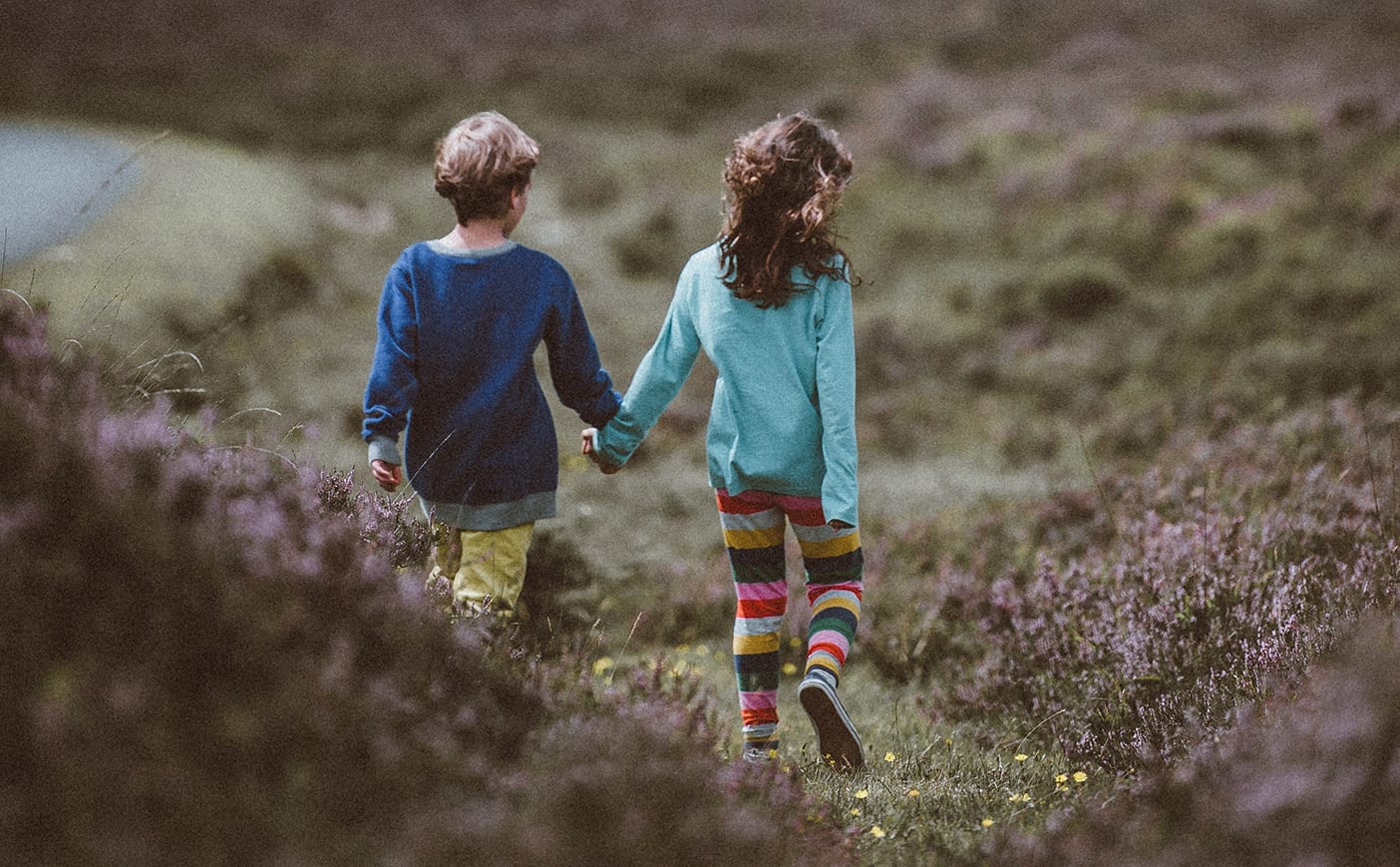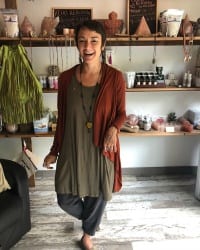
Want more from Sally? Learn from her in person at Wellspring in Downtown Palm Springs this October, and learn what it means to #ExperienceWell. Tickets available now!
Sally Kohn spent 15 years as a community organizer before landing a job at Fox News as the token liberal on-air. In her years there, she learned an important lesson: Though she had long figured that her colleagues were full of hate—loud as they were with opinions that were far different than her own—she realized over time that it was she who was judging them. She set out to learn what caused people to be so removed, and in her travels working on a book (The Opposite of Hate: A Field Guide to Repairing Our Humanity is available now) she postulated just what it is that causes us to separate ourselves into self-designated categories of “us” and “them.” Watch on for her learnings, and read below for more.
Wanderlust (WL): Let’s talk a little bit about this age that we’re living in. What does it mean to be an outsider? An insider?
Sally Kohn (SK): We are in interesting times when it comes to being an outsider versus being an insider. I think what’s important for us all think about is we all occupy both roles in different ways. But what’s interesting because of the moment we’re in, in society, where we’re all feeling inundated whether it’s politics, it’s the environmental crisis, crumbling infrastructure, failing schools, segregated neighborhoods, we are all feeling these mounting problems all around us. What’s interesting is part of that, we’re often focused on the ways on which we’re outsiders and the harm that’s being done to us by that status. We’re not often taking responsibility for the ways in which we’re insiders and what we can do constructively in those roles to help the people who feel like outsiders in those dynamics. So, we have to see both sides of it.
WL: Do you think that we always have a sense of fear or a sense of dislike for the other?
SK: Think about ourselves as hardware and software, right. The hardware that we all got when we popped out of the stores, predisposes us to think of the world as “us vs. them.” That’s evolutionary biology, we do have this tribalism and this preference for “our own.” That’s the hardware. Who we hate, who we decide as “us vs. them,” the identities, the categories that we give power and attention to, that is not part of our hardware. That’s the software. That is what we are taught by society, that is encoded into us through media, and politics, and culture. So, that can be changed.
WL: You really believe that people can change?
SK: You know, the only reason that I can do this work is because I’ve seen change happen in both history and in present day. So, we have to bear in mind that as a country, certainly, in the United States of America, we have never achieved the full equality, justice, compassion, humanity, equal treatment of others that we have aspired to. It’s been a rhetorical aspiration, we’ve never perfectly achieved it.
What is important to know is that, even in our country, a country in so many ways founded on and steeped in hate, we’ve progressed, we have gotten better. Our schools are still obscenely segregated today—more segregated today than 20 years ago—but 100 years ago, 150 years ago, most white people supported racial segregation of schools, and today they don’t. We as a society, changed. Twenty, 30 years ago we as a society were more homophobic than we are today, as another example. I know people in my life who were more homophobic than they are today. So, people have changed, can change, do change, and knowing that’s possible encourages at least me to work to encourage all of us to create the environment in which people can change as opposed to permanently condemning them to be nothing but hateful.
WL: How do you do that? How do you create an environment where people feel comfortable to change?
SK: So, in the history of the world, no one has ever changed because someone hated them so much, or some group of people hated them so much that they thought, “hey, I’m gonna go give them a gander because they hate me so much and treat me like I’m stupid,” right? So, there’s a moral dimension to this, which is you have to believe. This is, here I’m quoting Bryan Stevenson, “you have to believe that people are more than the worst thing they’ve done in life.” You also have to believe people are more than just the worst thing they’ve thought in life, or the worst thing they’ve said in life.
WL: When you were traveling around interviewing people for this book, what were some moments when you saw people make this leap, or when you were able to make a leap yourself in your own perception of other people?
SK: My book, The Opposite of Hate it’s not a destination, it represents a work in progress—me. I hope more and more of us try to pursue a path of kindness, humanity, justice, calling people in rather than calling people out, advocating for equality and humanity in our policies, and in our relationships, and in our interactions.
When I traveled around the country and the world talking to ex-neo-Nazis, and former terrorists, and people who participated in genocide, what I realized is honestly, how much we all have in common. And the disturbing thing about any of these extreme examples is that any of us can do them. That there isn’t something particularly unique or extraordinary about people who do extraordinarily hateful things, that we all can do it. The flip side is, from these stories, what I learned is we can all change. I mean, if they can change, there’s definitely hope for the rest of us.
WL: Was there ever a moment when you were interviewing these people that you were like, “Oh, shit, I do that. This is me.”
SK: There were a lot of moments when I was interviewing folks where I was like, “oh, wow, this is me.” I try to share as much as I can about my own faults, my own blind spots, my own mistakes, my own hate, because I think we spend too much time pointing the fingers at others. I mean, I will say this much, this is a fascinating moment in history, and this is a fascinating dynamic because I would say 99.9 percent of us agree that hate is a problem in our society right now, and 99.9 percent of us think it has nothing to do with us. That it’s a problem created by someone else. How can we have a problem, that everyone thinks is a problem, and no one actually thinks they’re responsible for it.
WL: What happens when we begin to treat outsiders as insiders? What happens when you open up your ears to an ex-neo-Nazi, to an ex-terrorist? Does that allow them to become an insider, and is that the opposite of hate?
SK: I’m gonna bust open that question because I don’t think this is about outsiders becoming insiders, insiders becoming outsiders. There actually is a larger, I think, project here in that the way we’ve tended to think about rights and justice in our world has been about the privileged vs. the excluded, and often the way we fix problems of injustice is to amend and append people onto the included, the us, while there’s still a them. I think the ultimate path to justice and equality is to get rid of the us and them, to get rid of the insider/outsider distinction, to see our wholeness, our connectedness—connectedness is the opposite of hate, spoiler alert—and to move into a direction where we are all aware of our own and each others humanity and dignity, and enact policies, live in a culture that reflects that.
Connect with and learn more from Sally at Wellspring!
—
 Lisette Cheresson is a writer, storyteller, yoga teacher, and adventuress who is an avid vagabond, homechef, dirt-collector, and dreamer. When she’s not playing with words, it’s a safe bet that she’s either hopping a plane, dancing, cooking, or hiking. She received her Level II Reiki Attunement and attended a 4-day intensive discourse with the Dalai Lama in India, and received her RYT200 in Brooklyn. She is currently the Director of Content at Wanderlust Festival. You can find her on Instagram @lisetteileen.
Lisette Cheresson is a writer, storyteller, yoga teacher, and adventuress who is an avid vagabond, homechef, dirt-collector, and dreamer. When she’s not playing with words, it’s a safe bet that she’s either hopping a plane, dancing, cooking, or hiking. She received her Level II Reiki Attunement and attended a 4-day intensive discourse with the Dalai Lama in India, and received her RYT200 in Brooklyn. She is currently the Director of Content at Wanderlust Festival. You can find her on Instagram @lisetteileen.
